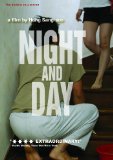| Reviews & Columns |
|
Reviews DVD TV on DVD Blu-ray 4K UHD International DVDs In Theaters Reviews by Studio Video Games Features Collector Series DVDs Easter Egg Database Interviews DVD Talk Radio Feature Articles Columns Anime Talk DVD Savant Horror DVDs The M.O.D. Squad Art House HD Talk Silent DVD
|
DVD Talk Forum |
|
|
| Resources |
|
DVD Price Search Customer Service #'s RCE Info Links |
|
Columns
|
|
|
Night and Day
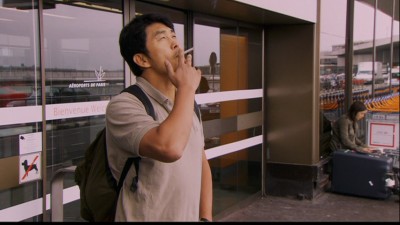
If South Korean filmmaker Hong Sang-soo has not (yet) experienced quite the groundswell of Stateside attention and acclaim that his compatriots Bong joon-ho (The Host, Mother) and Lee Chang-dong (Secret Sunshine, Poetry) have finally, rightfully begun to enjoy, it is not because he's been any less prolific or internationally well-regarded; as the credits of his stunning achievement of 2008, Night and Day, announce, it's his eighth film. No, if the vacillations of the foreign-film marketplace have not brought Hong more prominently onto everyone's radar (not that I have anyone but myself to blame for shamefully not yet following up on sound recommendations for prior Hongs like Woman on the Beach and Woman is the Future of Man--an omission that the fineness of Night and Day will force me to remedy posthaste), it is surely at least in part because his films, if Night and Day is any indication, are subtler and more ambitious, more "difficult," than those of the very worthy but decidedly slicker Bong (from what I've seen of his work) and more topical/narratively straightforward Lee (ditto). The film is nothing short of an assured masterpiece of contemplative, poetic, slightly surrealist cinema with which Bong easily earns himself a place somewhere in the same constellation that contains Kiarostami (Close-Up), Martel (The Headless Woman), and Apichatpong (Syndromes and a Century).
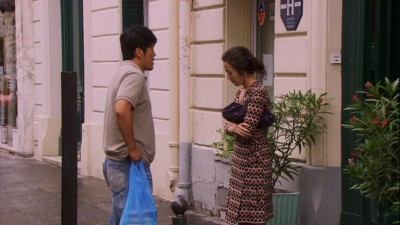
The film's main character/dreamer is Kim Sung-nam, a near-middle-aged, fairly successful Korean painter whom an initial title card informs us has fled Korea, hopping the first plane to Paris because he's been busted for smoking pot with some American students and fears the repercussions. But the very escape he attempts from his spot of legal trouble lands him in the midst of hauntings from his romantic past (and, possibly, future). He coincidentally runs into an ex, Min-sun, with whom he had an adulterous affair (she now lives in Paris with her French folklorist husband), and whose apparently casual, callous treatment at his hands--including, she says, undergoing six abortions because of her love and unwillingness to impose any restraint on him--along with her ongoing passion for him has left her vulnerable, unstable, and desperate. On top of this couple's stilted, futile, disturbing jabs at reigniting their affair (a disaster that only gets worse, especially for her), Kim encounters more female trouble when he is introduced by Mr. Jang, the superintendent at the claustrophobic Korean student housing hostel he's staying in by necessity, to a Korean art student, Hyung-joo (Seo Min-jeong), who develops a relatively unrequited crush on Kim; and by extension to her beautiful, impertinent roommate and fellow student, Yu-jeong (Park Eun-Hye). Kim recognizes Yu-jeong as a young woman of the married Min-sun's acquaintance, about whose stinginess and selfishness that ex-lover has warned him, but her youth and semi-derisive flirtatiousness get to him. (How troublesome, irresponsible, and disliked she actually is will only be revealed to us later.) Hyung-joo is the good girl of this duo, and the obviously healthy choice, but that's just the problem; the artistic, romantic, torn Kim is much more drawn to the indifferent but teasingly sexy Yu-jeong.
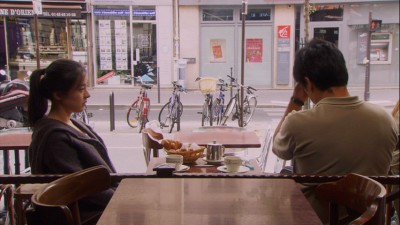
Meanwhile, we discover that the woman with whom Kim has been having very regular sad, lonely, longing Paris-Seoul phone conversations is his wife, whom he evidently misses and needs at the same time the film's other events revolving around past and potential future affairs are playing out. This odd symmetry and temporally super-coincidental grouping of the women in Kim's life (in addition to several mysterious, potentially symbolic but not at all obvious events in the film, like when Kim and two female members of a film crew rescue an invalid bird whose fall has been broken by Kim's shoulder, or the indelible, enigmatic image of a silhouetted boar's head butting against the window of a women's bathhouse) prompt us to ask some questions. Just what kind of exile is Kim in, really? Didn't the film's too-flatly-announced marijuana bust and six abortions seem at least slightly hyperbolic, exaggerated, "off," resembling the way the stage is set for imaginings or dreams? By the film's end, we are quite uncertain as to what proportion of the events, relationships, and even characters we've met are "real" as opposed to allegorical figures, memories, or dreams that Kim may well be experiencing as a daydream or nightmare. But wherever one may locate the exact dividing line between his "reality" and his guilty, needy, ambivalent subconscious or dream-self, the film is in its own (much more modern, reconstructed) way as effectively exquisite a cine-poem conveying the inner cacophony and problematics of a heterosexual male's desire--his slippery, confusing, sometimes anguished apprehension of what a woman is, what he wants a woman to be, and what those things mean for him and his actual relationships with women--as Eyes Wide Shut or Hitchcock's Vertigo.
Not that Night and Day is "dream-like" on its face in nearly the same way as Kubrick's film, or as high-strung as Hitchcock's masterpiece; nor is it as boldly, brazenly artificial as either. Hong's style is one of luminous, relaxed, utterly seductive (and gorgeous) naturalism, the main exception to that being the intermittent title cards announcing the date on which the scenes to follow are supposed to have occurred (these cards appear as painted characters on plain, dirtied scrap-canvas and are somewhat reminiscent of Ozu's title sequences), which suggest that we are being made privy to some sort of record, perhaps Kim's journal, though whether that would be a journal of memories from the day or dreams from the nighttime (hence the film's title?) becomes less and less certain. Night and Day is otherwise made up mostly of varying degrees of unassuming medium shot and accrues its dynamism through some of the most delicate, graceful, spontaneous-feeling but clearly minutely choreographed camera movements I have ever had the cinephilic wonder of experiencing. Hong repeatedly uses the devices of lateral pans and very brief zoom-ins/outs, which are ingeniously "simple" and work wonderfully--as if we are being shown, quite aptly for this film, details in a painting. And Kim's confessional voice-over as he addresses his inner meditations and interpretations to us are not the only thing here that recalls Rohmer's similarly-themed Love in the Afternoon; Night and Day could very validly be construed as a "moral tale," too, and one just as thoughtfully, sensitively, quietly profound as Rohmer's.
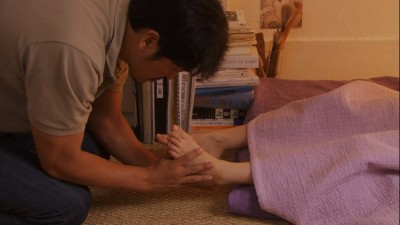
Both Hong and his characters are decidedly outsiders in the film's Paris, a city that has been chosen in this context for its foreignness and numerous associations for foreigners. Their Korean-ness is clearly a matter of some importance (not to mention pride, along with a little doubt) to both the characters and their creator; Hong pays notice to "local" concerns by presenting us with a fascinating, fertile subplot involving the tension between Kim and a North Korean student he meets and insults at a party, and there is a rich, running subtext about what it means to be a Korean in Paris, and more generally the meanings such a famous site gets imbued with by outsiders (as a place to escape to, a romantic place, an artist's place--a place that might make for a reflexive stand-in, in a dream, for the map of one's inner romantic memories, history, and geography). Not that we are taken on any kind of postcard tourist trip by Hong; the approach, trajectory, and meaning of this film are in some significant ways close to 180 degrees from Midnight in Paris (and it's absolutely not A Korean in Paris. His views of the city are his own, and they gain their beauty from the way he composes the film's images, most of which consist of everyday sidewalk/storefront exteriors and small-apartment interiors rendered magical by Hong and cinematographer Kim Hoon-kwang's brilliantly supple and astute framing, mise-en-scène, and lighting, which, along with its intuitively measured pacing and rhythm, are so important to the film's precise tone and so perfectly used to conjure its exactly right, uncertain balance between realism and daydream. Paris thus looks surprisingly ordinary in this film to us, its viewers; this serene film is much too intimate to make such fanfares. But what becomes salient and suggestive is that the city is experienced as extraordinary by the characters, particularly our protagonist, whose emotional POV and subjectivity may be coloring everything and everyone in the film, and whom in any case one feels like thanking (really, this is gratitude to Hong) at the end for letting us in on such an evocative, beautiful, and transfixing vision, whether that vision has been of his experiences, his subjective memories, or his dreams.
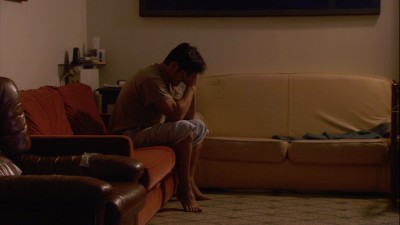
THE DVD:
There is some rare aliasing noted here and there in the film, with some pixellation/flickering noticeable in certain portions of the screen at some points. It also appears that the film is presented anamorphically in a 1.78:1 aspect ratio, though its theatrical ratio was apparently 1.85:1. Still, the transfer looks good overall, and there is nothing irredeemably distracting about the very minor artifacting or the apparently slightly altered aspect ratio.
Sound:The disc's excellent Dolby Digital 2.0 soundtrack brings the film's direct, carefully controlled sound design (mostly dialogue and very well-recorded and -mixed naturalistic ambience, along with judiciously deployed snatches of Beethoven's Seventh) to your speakers with complete undistorted, balanced clarity.
Extras:--Nothing but the film's theatrical trailer.


Highly Recommended. My shame at not having introduced my supposedly cinephilic self to the major artist that is the Korean filmmaker Hong Sang-soo before now is matched only by my joy and gratitude at the new availability on DVD of his 2008 masterpiece Night and Day finally affording me the opportunity to be awed. This enigmatic but ravishing film could be a dreamlike meditation on conjugal anxiety, the projection(s) of a conflicted monogamist, or the self-exploration/critique of contemporary heterosexual masculinity, but whatever the possible interpretations the film's engaging vividness could plausibly give rise to, I can say that, judging from its achievement alone, Hong's is the most unique voice from Korean cinema yet to emerge Stateside from a chorus that includes also-formidable filmmaking talents like Bong Joon-ho and Lee Chang-dong. His vision is at once quiet, reflective, naturalistic, and dreamy-verging-on-philosophical in a way that is singularly compelling, and you are simply missing out if you deny yourself its many pleasures. Now, if you'll excuse me, I must remedy my own negligence by tracking down ASAP Hong's latest film, The Day He Arrives. And the one before that, 2010's Hahaha. And his celebrated early film The Virgin Stripped Bare by Her Bachelors. And 2004's Woman Is the Future of Man. And....
|
| Popular Reviews |
| Sponsored Links |
|
|
| Sponsored Links |
|
|
| Release List | Reviews | Shop | Newsletter | Forum | DVD Giveaways | Blu-Ray | Advertise |
|
Copyright 2024 DVDTalk.com All Rights Reserved. Legal Info, Privacy Policy, Terms of Use,
Manage Preferences,
Your Privacy Choices | |||||||









